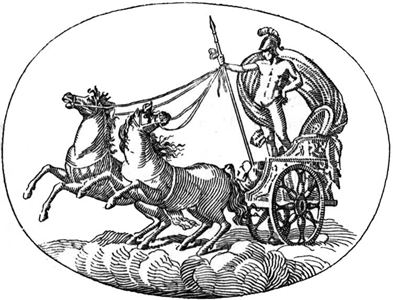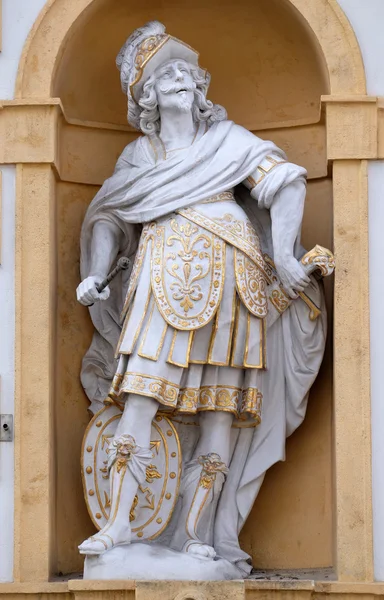

In the early 3rd century BCE, the comic playwright Plautus has a reference to Mars greeting Nerio, his wife. Her name was regarded as Sabine in origin and is equivalent to Latin virtus, "manly virtue" (from vir, "man"). The consort of Mars was Nerio or Nerine, "Valour." She represents the vital force (vis), power (potentia) and majesty (maiestas) of Mars. He may be presenting a literary myth of his own invention, or an otherwise unknown archaic Italic tradition either way, in choosing to include the story, he emphasizes that Mars was connected to plant life and was not alienated from female nurture. In the earliest Roman calendar, March was the first month, and the god would have been born with the new year. It may explain why the Matronalia, a festival celebrated by married women in honor of Juno as a goddess of childbirth, occurred on the first day of Mars' month, which is also marked on a calendar from late antiquity as the birthday of Mars.

Ovid tells this story in the Fasti, his long-form poetic work on the Roman calendar. Juno withdrew to Thrace and the shore of Marmara for the birth. She then plucked a flower ritually using her thumb, touched Juno's belly, and impregnated her. Flora obtained a magic flower ( Latin flos, plural flores, a masculine word) and tested it on a heifer who became fecund at once.
#Mars god of war how to
Jupiter had usurped the mother's function when he gave birth to Minerva directly from his forehead (or mind) to restore the balance, Juno sought the advice of the goddess Flora on how to do the same. The importance of Mars in establishing religious and cultural identity within the Roman Empire is indicated by the vast number of inscriptions identifying him with a local deity, particularly in the Western provinces.Īlthough Ares was the son of Zeus and Hera, Mars was the son of Juno alone.

His love affair with Venus symbolically reconciled the two different traditions of Rome's founding Venus was the divine mother of the hero Aeneas, celebrated as the Trojan refugee who "founded" Rome several generations before Romulus laid out the city walls. In the mythic genealogy and founding myths of Rome, Mars was the father of Romulus and Remus with Rhea Silvia. Īlthough Ares was viewed primarily as a destructive and destabilizing force, Mars represented military power as a way to secure peace, and was a father (pater) of the Roman people. Although the center of Mars' worship was originally located outside the pomerium, or sacred boundary of Rome, Augustus brought the god into the center of Roman religion by establishing the Temple of Mars Ultor in his new forum. Mars' altar in the Campus Martius, the area of Rome that took its name from him, was supposed to have been dedicated by Numa himself, the peace-loving semi-legendary second king of Rome. Mars was a part of the Archaic Triad along with Jupiter and Quirinus, the latter of whom as a guardian of the Roman people had no Greek equivalent. However, the character and dignity of Mars differed in fundamental ways from that of his Greek counterpart, who is often treated with contempt and revulsion in Greek literature. Under the influence of Greek culture, Mars was identified with the Greek god Ares, whose myths were reinterpreted in Roman literature and art under the name of Mars. His festivals were held in March, the month named for him (Latin Martius), and in October, which began and ended the season for military campaigning and farming. He was second in importance only to Jupiter, and he was the most prominent of the military gods worshipped by the Roman legions. Mars ( Latin: Mārs, adjectives Martius and Martialis) was the Roman god of war and also an agricultural guardian, a combination characteristic of early Rome.


 0 kommentar(er)
0 kommentar(er)
